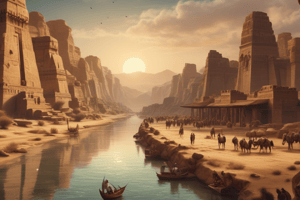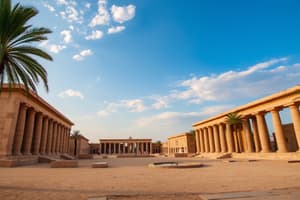Podcast
Questions and Answers
Which one of these is the most correct?
Which one of these is the most correct?
- This one sounding similar
- This one (correct)
- This one that also sounds similar
- This one also sounding similar
?
?
- , , (correct)
- 8-4
- ,
?
?
- , (correct)
- 1600
- , (correct)
?
?
?
?
?
?
Study Notes
Ancient Civilizations: An Overview and Exploration
Ancient civilizations, as part of the larger field of ancient history, refer to the complex, organized societies that emerged during the pre-modern era. These civilizations played significant roles in shaping human culture and influencing our modern world through their advancements in technology, governance, religion, and arts. In this article, we will explore some prominent ancient civilizations and their contributions to human history.
Ancient Mesopotamia
Located between the Tigris and Euphrates rivers, ancient Mesopotamia is considered one of the cradles of civilization. It was home to several ancient civilizations including the Sumerians, Akkadians, Babylonians, and Assyrians. These civilizations developed cuneiform script, the earliest form of written communication, and introduced systems of governance and economics that influenced later societies. Archaeological sites such as Ur, Nineveh, and Babylon offer insights into their daily lives, religious practices, and monumental architecture.
Ancient Egypt
Ancient Egypt is another prominent civilization known for its iconic pyramids, pharaohs, and hieroglyphics. It developed along the Nile River and thrived for more than 3,000 years, from around 3100 BC until 332 BC. Ancient Egyptians introduced systems of government based on divine kingship, developed complex hieroglyphic writing, and built impressive structures like the Great Pyramids of Giza. Their society also lauded achievements in art, science, and mathematics.
Indus Valley Civilization
The Indus Valley Civilization, which dates back to around 2600-1900 BC, was located in present-day Pakistan and northwestern India. It encompassed several cities, including Harappa and Mohenjo-Daro, known for their well-planned urban layout, advanced drainage system, and sophisticated trade networks. Although less studied compared to other ancient civilizations, it serves as a significant indicator of early human civilization.
China
Ancient China is another influential civilization that emerged around 1600 BC. It developed along the Yellow and Yangzi rivers and underwent numerous dynastic changes over more than 3,000 years. Ancient Chinese civilization introduced concepts like Confucianism, Taoism, and the Great Wall of China while contributing to advancements in agriculture, metallurgy, and traditional Chinese medicine.
Ancient Greece and Rome
Ancient Greece (8th-4th century BC) and ancient Rome (753-476 AD) are two well-studied civilizations. The Greeks made significant contributions to philosophy, drama, democracy, and architecture, while the Romans expanded their empire through military conquest and assimilation of various cultures, leading to lasting impacts on modern language, governance, and architectural styles.
Understanding these ancient civilizations allows us to appreciate the historical context that has shaped our current society. By studying the accomplishments and challenges faced by those who came before us, we can gain valuable perspective for navigating our own world today.
Studying That Suits You
Use AI to generate personalized quizzes and flashcards to suit your learning preferences.
Description
इस पाठ में हम पारंपरिक इतिहास के तहत प्राचीन सभ्यताओं को जानेंगे जिन्होंने मानव संस्कृति को आकार दिया और हमारी आधुनिक दुनिया को अपने प्रौद्योगिकी, शासन, धर्म, और कला में अग्रणी बनाने में महत्वपूर्ण भूमिका निभाई।




